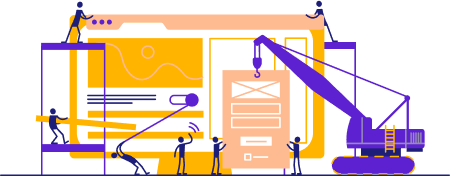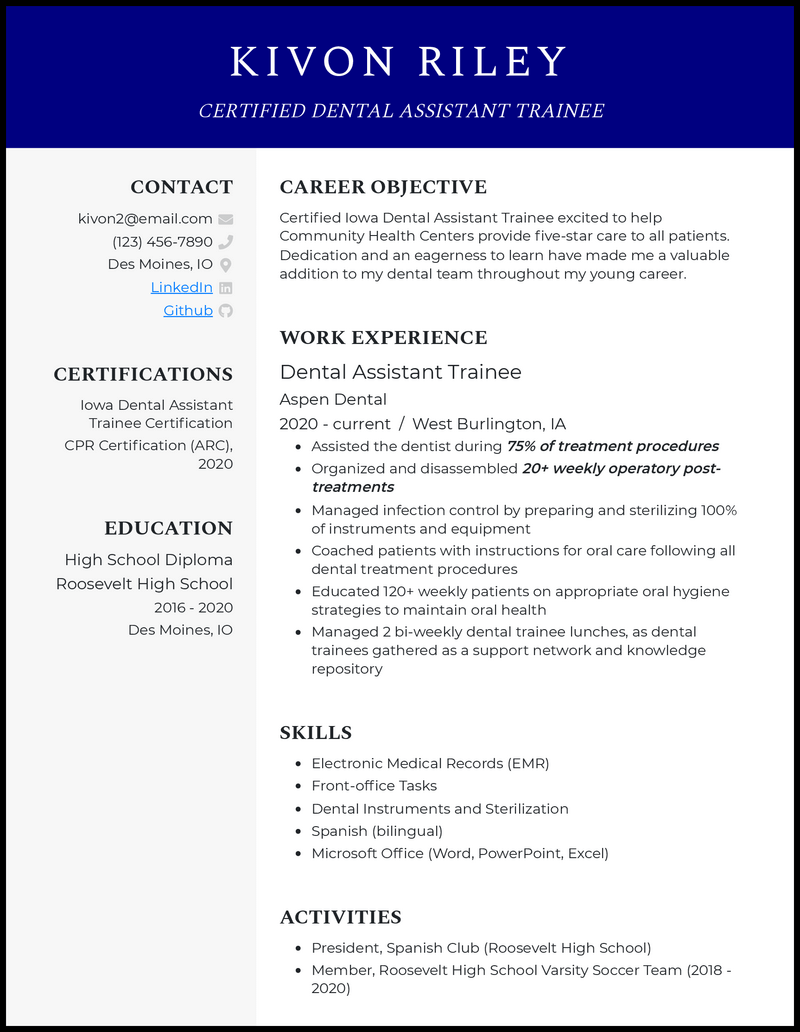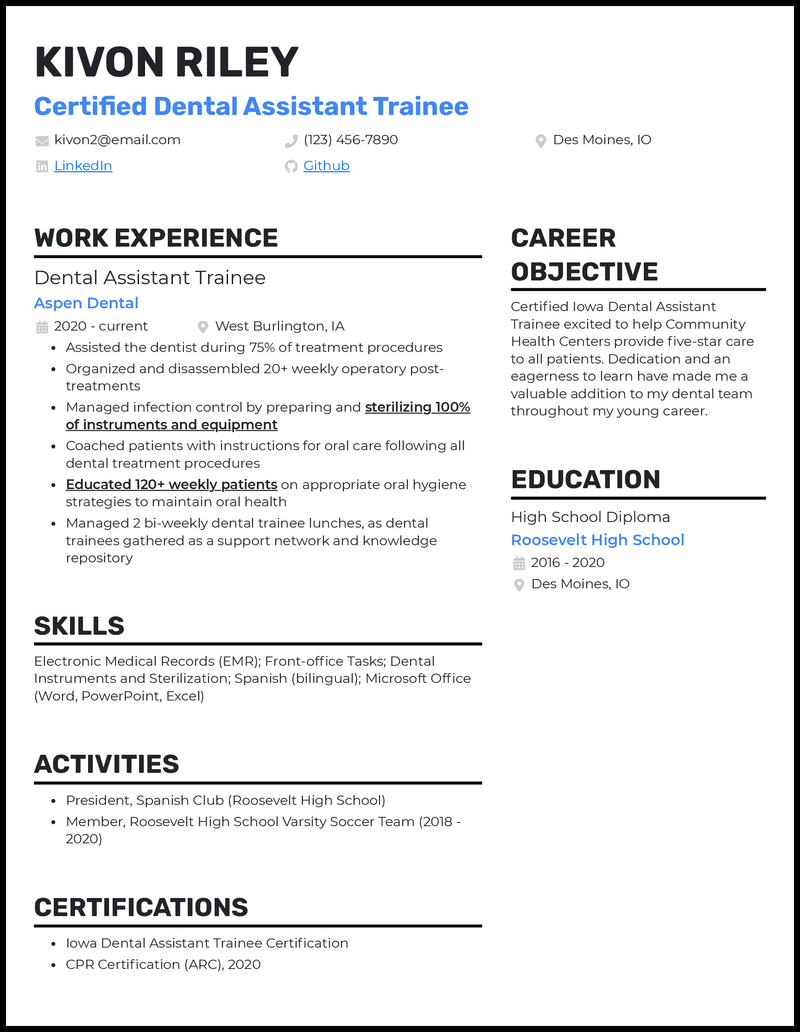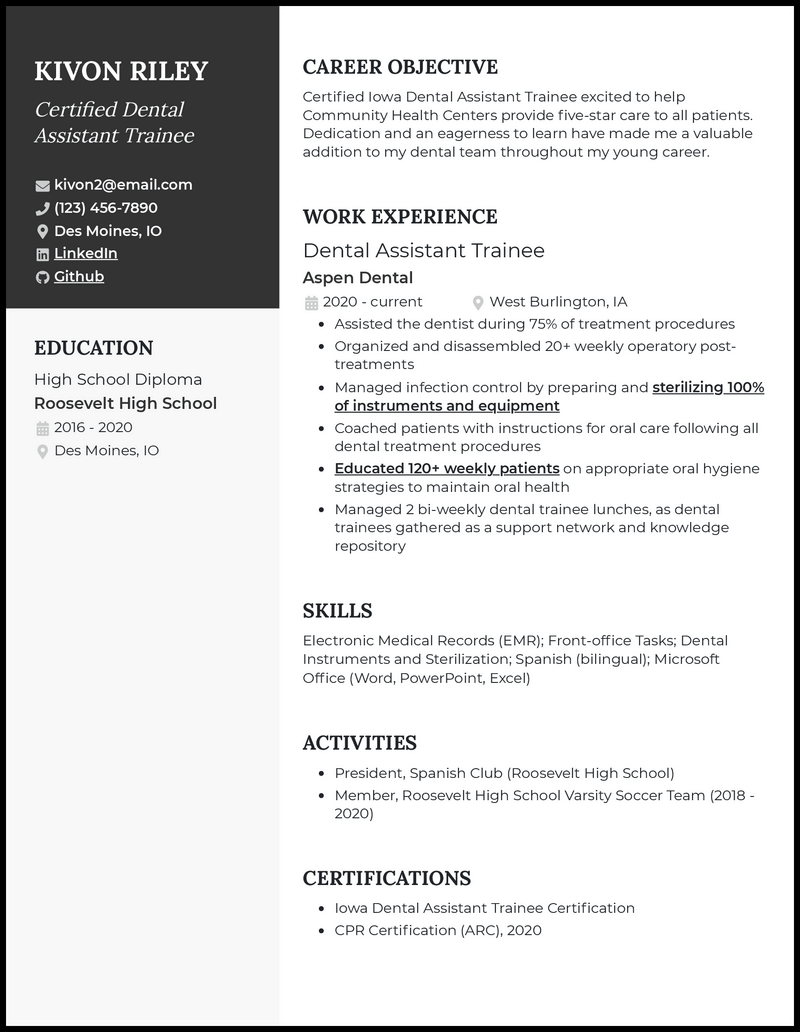You help dentists by completing supporting tasks like taking castings for studies and diagnostics, administering anesthetics, and preparing dental cleaning tools. Patient check-ins and insurance form prep and coding may also be routine parts of your workday.
You need to write a cover letter and a good resume, but how do you demonstrate your qualifications and summarize all the ways you streamline dental workplace operations?
Don’t worry: We unlock the mystery with our three beginner dental assistant resume templates and time-tested tips that are helping lots of folks like you in this field!
Copy this text for your beginner dental assistant resume!
Kivon Riley
Certified Dental Assistant Trainee
[email protected]
(123) 456-7890
Des Moines, IO
CAREER OBJECTIVE
Certified Iowa Dental Assistant Trainee excited to help Community Health Centers provide five-star care to all patients. Dedication and an eagerness to learn have made me a valuable addition to my dental team throughout my young career.
WORK EXPERIENCE
Dental Assistant Trainee
Aspen Dental
2020 – current
West Burlington, IA
– Assisted the dentist during 75% of treatment procedures
– Organized and disassembled 20+ weekly operatory posttreatments
– Managed infection control by preparing and sterilizing 100% of instruments and equipment
– Coached patients with instructions for oral care following all dental treatment procedures
– Educated 120+ weekly patients on appropriate oral hygiene strategies to maintain oral health
– Managed 2 bi-weekly dental trainee lunches, as dental trainees gathered as a support network and knowledge repository
SKILLS
– Electronic Medical Records (EMR)
– Front-office Tasks
– Dental Instruments and Sterilization
– Spanish (bilingual)
– Microsoft Office (Word, PowerPoint, Excel)
EDUCATION
High School Diploma
Roosevelt High School
2016 – 2020
Des Moines, IO
CERTIFICATIONS
– Iowa Dental Assistant
– Trainee Certification
– CPR Certification (ARC), 2020
ACTIVITIES
– President, Spanish Club (Roosevelt High School)
– Member, Roosevelt High School Varsity Soccer Team (2018 – 2020)
Why this resume works
- Hundreds of candidates are itching to jump into that white apron as your dream company’s newest beginner dental assistant. Be a cut above by jazzing up your beginner dental assistant resume with some extra flair.
- Think beyond the basics. Sprinkling in additional sections like “CERTIFICATIONS” and “ACTIVITIES” is not just about filling space—it’s about showcasing you’re a round character with skills that can smoothly transition into your dream role.
What Matters Most: Your Skills & Work History

Since you’re working at a beginner level within the dental field, you’ll really want to emphasize the skills for the role: Make sure you stick with abilities that are closely tied to your job instead of generic skills that could fit anywhere.
Talk about how you sterilize dental equipment or cast dental molds instead of focusing on things outside your niche. You also want to be as specific as possible about exactly what you do to make things easier for dentists and patients alike.
Don’t say “communication” when you could specify “patient intake.” Don’t say “paperwork” when you could say “insurance forms.”
9 top beginner dental assistant skills
- EMR
- Insurance Form Coding
- Patient Intake
- Data Entry
- Equipment Sterilization
- Dental Tool Prep
- MS Excel
- Phone Screenings
- Appointment Schedules
Sample beginner dental assistant work experience bullet points
Some beginner applicants balk when they get to the experience section if they don’t have much work history. But don’t sweat it: You can use other things like relevant college activities to bulk up your qualifications for a dental assistant role.
Recruiters value your experience since it shows that you can utilize your skills to the fullest, so jot down any dental assistant internships or trainee programs you’ve completed. Break those down further into individual accomplishments like improving patient satisfaction or elevating your personal feedback rating.
And never forget to measure your impact! Use quantifiable data to show how you made a difference (improvement percentages, star ratings, faster care provision rates, etc.).
Check out these samples:
- Managed bi-weekly dental trainee lunches, improving trainee engagement and boosting final ratings by 7%
- Coached patients with instructions for post-treatment oral care, earning a personal feedback rating of 4.8/5.0 stars
- Efficiently assisted the lead dentist during 76% of treatment procedures, reducing procedure times by 8%
- Educated over 124 weekly patients on appropriate oral hygiene strategies to maintain oral health, elevating patient satisfaction ratings by 17%
Top 5 Tips for Your Beginner Dental Assistant Resume
- Show your patient demographic
- Make sure it’s clear whether you work primarily with seniors, pediatric patients, or the general public—and tailor your resume according to the job. You don’t want to send a youth-focused resume to a facility that provides dental care for seniors!
- Tailor your experience points closely
- Take your resume customization a step further by revisiting the dental assistant job description and combing for key values you can reflect in your resume: Consider the balance of patient-facing vs. bedside tasks, and tweak your own emphasis accordingly.
- Get technical
- Even when you’re referring to a soft skill, like clear communication or a compassionate bedside manner, you want to present your abilities through a technical lens. Make it clear what you use those skills for when it’s time to initiate a dental procedure.
- Don’t forget clerical tasks
- Don’t leave out important duties like scheduling appointments and answering phone calls at the front desk. Not every hour of your workday will be spent assisting dentists directly, and recruiters need to know you can handle the rest.
- Bolster your experience with creds
- Include credentials like a Dental Assistant (RDA) or CPR certification to bulk up your resume if you’re short on experience, as many beginner dental assistants are.
How to Write a Beginner Dental Assistant Resume

- Select a resume template with room for many types of experiences
Beginning dental assistants may have a limited amount of work experience to list. So, a template that allows for an objective, hobbies or interests, or educational achievements can be a great fit. It’ll help show alternative skills and interests, like how you participated in your school’s anatomy club, which could help attest to your dental anatomy knowledge.
- Consider using an objective
An objective will help beginning dental assistants catch a dental hiring manager’s attention with some key abilities right away. For instance, if you’ve worked in customer service-related positions for three years, you could explain in your objective how you’ll apply those skills to provide an excellent dental patient experience.
- Use skills you gained through education
You likely acquired many essential skills while obtaining your dental assistant associate’s degree or certificate. You should lean on those skills you gained, like how to perform X-rays or proper sterilization practices, to emphasize the most relevant qualifications on your resume.
- Explain your dental assisting capabilities in an active voice
When working with patients, you’d want to use an active voice to make dental procedures feel like a positive experience. You can do the same on your resume to make your examples more engaging. A great starting point is using action words like “examined” or “treated” in your examples.
Nope, don’t worry about it! You definitely want to limit yourself to a one-page resume template, but you don’t want to add filler. Sticking with fewer, but more solid examples of how you can handle insurance forms or cast dental molds is more effective.
Absolutely! Experience doesn’t have to be paid to count: If you participated in a volunteer outreach program that familiarized you with procedural codes for insurance or patient intake routines, do tell.
If you have unique, standout skills like bilingual translation or an unusual familiarity with medical equipment operation, include them! There are plenty of situations where those skills could benefit patients.








